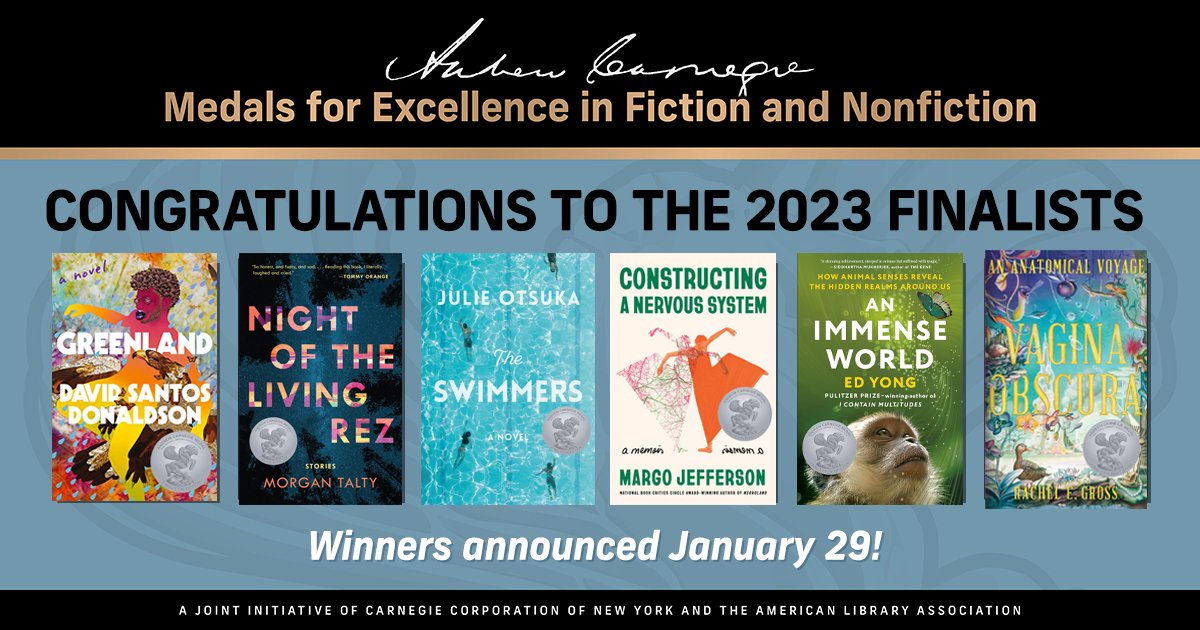We announced the short list yesterday, but the 15th is always LibraryReads Day so I bumped the official announcement of the ACM Short List to today's blog post.
Click here to a longer post when I talked about how to use this award as resource.
But today, I want to celebrate our committee and our year of work with this wonderful 6 booklist. Below I have the full announcement, but you can always access the website with access to finalists as well as easy access to every year's long list, finalists and winners here.
All of the title links below go to the Booklist reviewed for each finalist.
2023 Winners
 |
| Click here to go tot he site |
Six books (3 fiction, 3 nonfiction) have been selected as finalists for the 2023 Andrew Carnegie Medals for Excellence in Fiction and Nonfiction. Two medal winners will be announced by 2023 selection committee chair Stephen Sposato at the Reference and User Services Association’s Book and Media Awards live streaming event, during LibLearnX on Sunday, January 29th at 4:30 p.m. CT.
A celebratory event, including presentations by the winners and a featured speaker, will take place at the ALA Annual Conference in June 2023 in Chicago.
Carnegie Medal winners will each receive $5,000.
Share your favorite Andrew Carnegie Medal shortlist titles on social media using the #ALA_Carnegie hashtag!
FICTION FINALISTS
Greenland.
David Santos Donaldson.
(Amistad, an imprint of HarperCollins Publishers)
Donaldson delivers a psychologically acute portrayal of a queer Black man crumbling under the weight of personal, historical, and racial trauma. Despite heavy subject material, Kip’s irreverent narration provides moments of memorable levity.
Night of the Living Rez.
Morgan Talty.
(Tin House)
At the heart of this collection of linked stories is David, a member of the Penobscot Nation in Maine, in whose small world Native traditions mix matter-of-factly with binge-watches of The Sopranos. With a clear-eyed and compassionate gaze, Talty reveals the complexity of his characters and the ways they are shaped by their community and their pasts.
The Swimmers.
Julie Otsuka.
(Alfred A. Knopf, a division of Penguin Random House LLC)
In an underground pool, a collective “we” reports the comings and goings of the titular swimmers, regulars who have established their schedules, lanes, and paces with comforting familiarity, until a crack in the pool floor causes upheaval. The water was an essential haven for Alice, whose story aboveground is a polyphonic reveal through her fading memories. Otsuka’s devastating masterpiece is an extraordinary examination of the fragility of human relationships.
NONFICTION FINALISTS
Constructing a Nervous System.
Margo Jefferson.
(Pantheon Books, a division of Penguin Random House LLC)
Blending the multicolored threads of Black cultural life with memories of her past in this impressionistic memoir, Jefferson reflects on the Black icons who shaped her worldview, from jazz great Bud Powell to legendary entertainer and Resistance hero Josephine Baker. Jefferson is a critic’s critic, turning her keenly honed analysis on herself, her family, and her class, while relentlessly interrogating the broader underlying context of white racism.
An Immense World: How Animal Senses Reveal the Hidden World around Us.
Ed Yong.
(Random House, a division of Penguin Random House LLC)
The animals and their unique perceptual abilities Yong examines here range from the platypus with a bill that detects electric fields, the echolocation prowess of bats and dolphins, the ultrafast vision of killer flies, and the outstanding olfaction of elephants. Yong’s scientific curiosity is contagious, and his writing is empathetic, impeccably researched, imaginative, and entertaining.
Vagina Obscura: An Anatomical Voyage.
Rachel E. Gross.
(W.W. Norton & Company)
Realizing that the terminology for what medicine refers to as “the female reproductive system” was insufficient, Gross set out to correct this. The result expertly balances authoritative sources, history, and scientific data with frank discussions by medical professionals, scientists, and people of all genders.







No comments:
Post a Comment